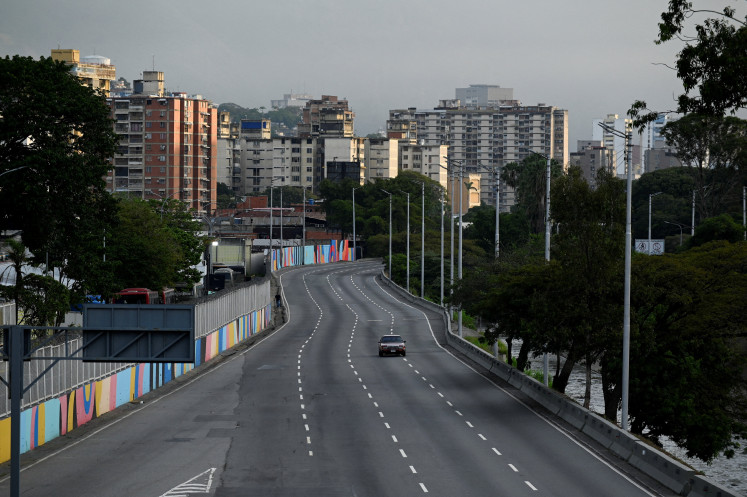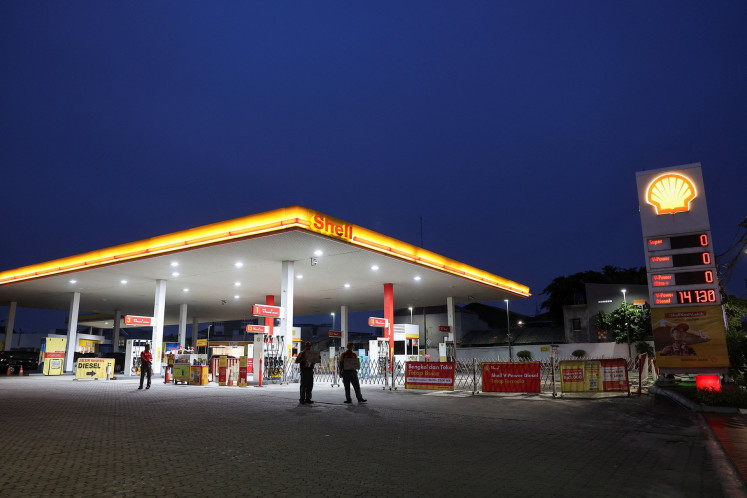Popular Reads
Top Results
Can't find what you're looking for?
View all search resultsPopular Reads
Top Results
Can't find what you're looking for?
View all search resultsTerrorism and the future of investment in Southeast Asia
The year 2016 has not gotten off to an auspicious start for Indonesia
Change text size
Gift Premium Articles
to Anyone
T
he year 2016 has not gotten off to an auspicious start for Indonesia. The country and its new president both weathered multiple headwinds in 2015 and the turn of the new year brought some promise of a fresh start for the Indonesian economy.
But the recent attack involving multiple bomb blasts and shootings that struck at the heart of Jakarta has brought renewed uncertainty about the already weakened Indonesian market and unnerved investors weakened the rupiah further.
The impact of the Jakarta terrorist attacks have economic implications for the region as well. First, the attacks bring sharply into focus a possible future for Southeast Asia, where the war on terrorism which used to take place further away in places such as the Middle East, will make its effects felt much closer to home and with higher frequency. Investors unused to such security risks in Southeast Asia may need to get used to them as part of a new landscape for the region.
The second will be the challenge for governments to reassure investors that such risks will not dim Southeast Asia's prospects of becoming a growth engine for the world.
So far, President Joko 'Jokowi' Widodo's approach has been to take a measured and less dramatic approach in responding to radicalism and extremist groups in his country. Instead of calling for a war on terrorism, as the West and other Middle Eastern states have done, President Jokowi denounced the attacks and sought to reassure his people and the rest of the world that his government and security forces have the situation under control.
While it may not have been the intended effect, Bank Indonesia's announcement that it would cut interest rates in order to boost economic growth on the back of the bomb blasts also served as an important signal to investors that despite the tragedy and ongoing manhunt, it was business-as-usual in Indonesia.
Indonesia holds much promise for many investors keen to take advantage of the huge consumption potential of the populous nation. But even as Indonesia continues to be one of Southeast Asia's brightest sparks with the potential to draw foreign investors from all over the world, the country could also be the region's weakest link.
Its vast archipelago and porous maritime borders represent favorable conditions and a suitable environment for terrorist cells to breed and thrive, as well as to recruit from not only within Indonesia, but also its ASEAN neighbors.
As a president overseeing a country with world's largest Muslim population, President Jokowi's preference has been for softer and more preventive methods to balance the harder efforts of law-enforcement and anti-terror forces.
Since his days as mayor of Solo, he has advocated creating and working with moderate interfaith dialogue groups, encouraging public education to curb the spread of Islamic extremist propaganda, as well as addressing socio-economic inequality to deal with radicalism and extremism.
But with terrorist activity picking up not only in Indonesia but the region, President Jokowi will need to move forward with more urgency on plans to control the spread of Islamic extremism in his country.
Going by his preference to tackle the root cause of extremism, this will include a multi-pronged approach to address Indonesia's development gaps and the country's widening socio-economic inequality and the lack of quality jobs, especially for the younger generation.
To do this, he needs to start by getting Indonesia's economy back on track in terms of growth. It is even more critical now for President Jokowi to move ahead resolutely with several economic policy packages that his administration rolled out in the last two quarter of 2015.
_______________________________
Alarmist and aggressive methods are unlikely to work, and could divide the region.
The packages call for quality foreign investment that would not only help existing primary industries move up the value chain, but also spark the development of new industries such as e-commerce, pharmaceuticals and the information and communications technology sector. These are targeted at creating new jobs and boosting domestic consumption.
Funneling investment towards developing and modernizing the many island provinces and regions outside Jakarta has also been a key priority for the Jokowi administration. Ensuring the equitable development of Indonesia will be important to ensure that its people, especially the youths, have less impetus to give in to the allure of radical Islamist terrorist groups in the medium to long term.
Efforts to develop the country's software ' its people ' should not be ignored either. Compared to its ASEAN neighbors, Indonesia lacks a strong professional labor force that is proficient in the English language. This is a key stumbling block in Indonesia's economic progress and the country's Achilles heel if it wants to be a frontrunner in ASEAN. A population that is largely poorly educated is also at higher risk of succumbing to terrorist recruitment.
Some fear that Indonesia might become the capital of terrorism in Southeast Asia. But there is also potential for the country to show how a moderate Muslim majority and democracy can lead the way in a counter-extremist global movement that embraces inclusiveness, tolerance and peace.
Indonesia must also show conviction and leadership in setting up an intensive and effective deradicalization program that seeks to rehabilitate deportees and also addresses the hundreds of convicted terrorists that will be released from prison once their jail terms are up as early as this year.
Laws on anti-terrorism also need to be strengthened and enforced so that Indonesian police are able to act quickly to stop terrorist attacks from being planned or taking place.
Whether or not Jokowi's approach is the best one remains to be seen. But it does present an alternative way, one different from those adopted in the West, to tackle terrorism. As a region poised to be the world's next economic growth engine, alarmist and aggressive methods are unlikely to work, and could divide the region.
Instead, a united effort among governments in Southeast Asia to cooperate against terrorism could be more effective, and go a long way to reassure investors that each country's government is committed towards building a stable and safe environment for business and investment in the region.
__________________________________
Nicholas Fang and Cheryl Tan are, respectively, executive director and deputy director for ASEAN at the Singapore Institute of International Affairs (SIIA).










